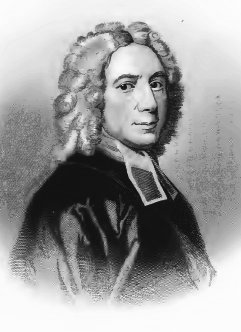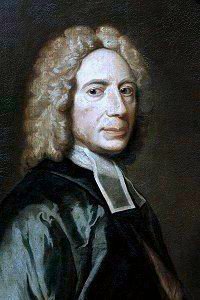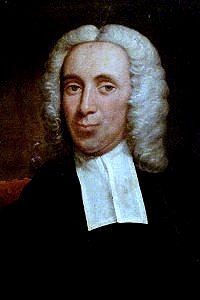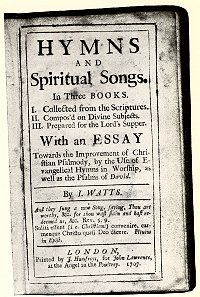Introduction


Born: July 17, 1674, Southampton, England.
Died: November 25, 1748, Stoke Newington, London, England.
Buried: Bunhill Fields, London, England.




Born: July 17, 1674, Southampton, England.
Died: November 25, 1748, Stoke Newington, London, England.
Buried: Bunhill Fields, London, England.


Isaac Watts, D.D., pastor of a Church of Christ in London, successor to the Rev. Joseph Carlyl, Dr. John Owen, Mr. David Clarkson, and Dr. Isaac Chauncey, after fifty years of feeble labours in the Gospel, interrupted by four years of tiresome sickness, was at last dismissed to his rest. Inuno Iesu omnia. 2 Cor. v. 8 Absent from the body, and present with the Lord. Col. iii 4. When Christ, who is my life, shall appear, then shall I also appear with him in glory.
This monument, on which the above modest inscription is placed, by order of the deceased, was erected as a small testimony of regard to his memory, by Sir John Hartopp and Dame Mary Abney.
Watts’ father was a Nonconformist imprisoned twice for his religious views. Isaac learned Greek, Latin, and Hebrew under Mr. Pinhorn, rector of All Saints, and headmaster of the Grammar School in Southampton.
Isaac’s taste for verse showed itself in early childhood, and his promise caused a local doctor and other friends to offer him a university education, assuming he would be ordained in the Church of England.
However, Isaac declined and instead entered a Nonconformist Academy at Stoke Newington in 1690, under the care of Thomas Rowe, pastor of the Independent congregation at Girdlers’ Hall; Isaac joined this congregation in 1693.
Watts left the Academy at age 20 and spent two years at home. It was during this period that he wrote the bulk of his Hymns and Spiritual Songs. They were sung from manuscripts in the Southampton Chapel, and published 1707–09.
The next six years of his life were again spent at Stoke Newington, working as tutor to the son of eminent Puritan John Hartopp. The intense study of these years is reflected in the theological and philosophical material he subsequently published.
Watts preached his first sermon at age 24. In the next three years, he preached frequently, and in 1702 was ordained as pastor of the Independent congregation in Mark Lane. At that time he moved into the house of a Mr. Hollis in the Minories.
His health began to fail the next year, and Samuel Price was appointed as his assistant in the ministry.
In 1712, a fever shattered his constitution, and Price became co-pastor of the congregation, which had moved to a new chapel in Bury Street.
It was at this time that Isaac became the guest of Sir Thomas Abney. He lived with Abney (and later Abney’s widow) the rest of his life, mainly at Theobalds in Hertfordshire, then for 13 years at Stoke Newington.
In 1728, the University of Edinburgh awarded Watts a Doctor of Divinity degree.
Hast thou not seen, impatient boy!
Hast thou not read the solemn truth,
That grey experience writes for giddy youth
On every mortal joy?
Pleasure must be dashed with pain:
And yet with heedless haste
The thirsty boy repeats the taste,
Nor hearkens to despair,
But tries the bowl again.
The rills of pleasure never run sincere:
(Earth has unpolluted Spring)
From the cursèd soil,
Some dangerous taint they bear;
So roses grow on thorns,
And honey wears a sting.
In vain we seek a Heav’n below the sky;
The world has false, but flattering charms;
Its distant joys show big in our esteem,
But lessen still as they draw near the eye;
In our embrace the visions die,
And when we grasp the airy forms
We lose the pleasing dream.
Earth, with her scenes of gay delight,
Is but a landscape rudely drawn,
With glaring colors, and false light;
Distance commends it to sight,
For fools to gaze upon;
But bring the nauseous daubing nigh,
Coarse and confused the hideous figures lie,
Dissolve the pleasure, and offend the eye.
Look up, my soul, pant toward th’eternal hills;
Those heav’ns are fairer than they seem;
There pleasures all-sincere
Glide on in crystal rills,
There not a dreg of guilt defiles,
Nor grief disturbs the stream.
That Canaan knows no noxious thing,
No cursèd soil, no tainted spring,
Nor roses grow on thorns,
Nor honey wears a sting.
Isaac Watts
Horæ Lyricæ
The Spacious Fields
Your Work Is Vain
Where Are the Mourners?Saith the Lord
Yet,Saith the Lord